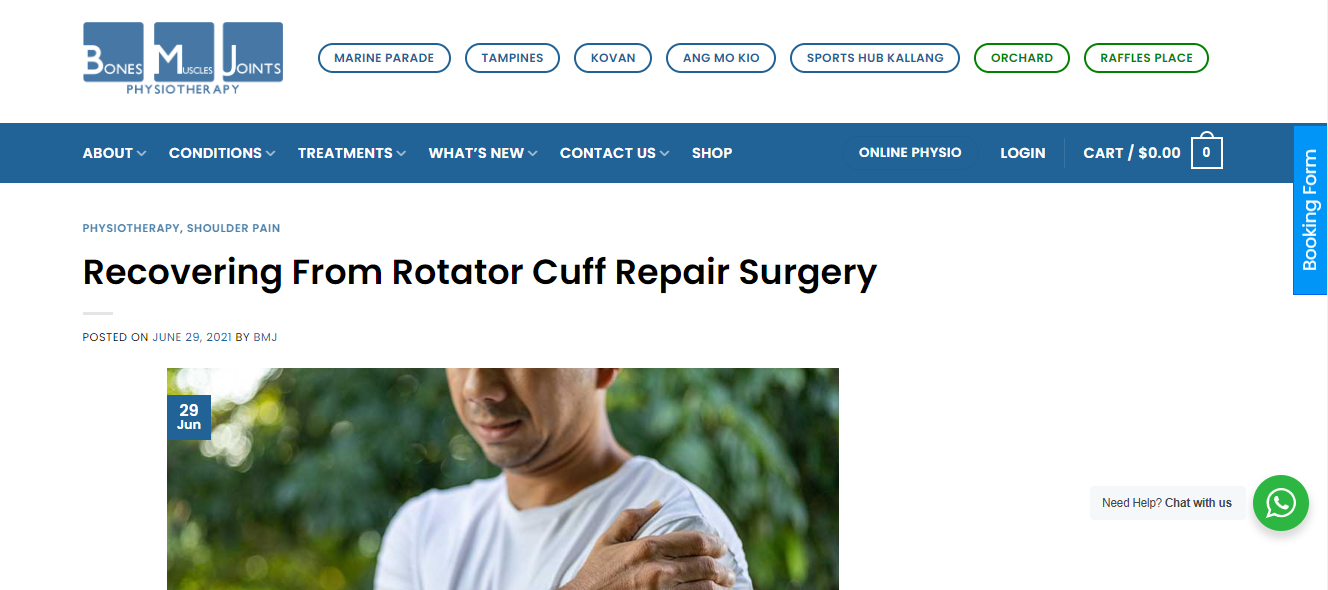
Rotator cuff repair is a commonly performed shoulder surgery for torn rotator cuff tendons. Learn about recovery time for rotator cuff surgery and the essential steps to regain pain-free shoulder function.
Rotator cuff injuries can occur suddenly due to accidents or gradually over time, particularly in the elderly population. When conservative management fails to provide relief, rotator cuff repair surgery becomes a viable option. At BMJ Physiotherapy, we understand the challenges patients face during the recovery process. In this article, we'll guide you through the journey of recovering from rotator cuff repair surgery, emphasizing the importance of patience, dedication, and expert care.
Understanding the Injury:
A torn rotator cuff tendon can significantly impact your quality of life. Whether it results from a traumatic incident or develops gradually, the decision to opt for surgery is not one to be taken lightly. Not all tendon tears require surgical intervention. The human body possesses a remarkable ability to heal itself, and in some cases, the surrounding muscles can compensate for the damaged tendon, allowing the shoulder to function reasonably well.
Conservative Management:
Before rushing into surgery, it is crucial to explore conservative management options. Patients with rotator cuff tendon tears are advised to undergo at least six weeks of non-surgical treatment. Conservative management may include physical therapy, rest, anti-inflammatory medication, and lifestyle modifications. During this period, it's essential to explore alternative therapies to promote healing and pain relief.
The Road to Recovery:
Rotator cuff repair surgery is not a magical solution that instantly restores normal shoulder function. Instead, it marks the beginning of a challenging journey towards recovery. Patients and their families need to comprehend the dedication and time required for successful rehabilitation before opting for surgery.
Post-Surgery Quarantine:
Following rotator cuff repair surgery, the shoulder enters a state of quarantine for approximately six weeks. During this period, patients must wear an arm sling 24 hours a day. This immobilization is crucial to prevent excessive movement of the arm, reducing the risk of complications and allowing the surgically repaired tendons to heal properly.
Recovery Time:
Recovery time for rotator cuff surgery varies from person to person. While the initial six weeks focus on immobilization, the subsequent months are dedicated to rehabilitation. Physical therapy plays a vital role in regaining strength, range of motion, and function. It's essential to follow the guidance of a skilled physiotherapist who will tailor a rehabilitation program to meet your specific needs.
Patience and Dedication:
Recovering from rotator cuff repair surgery demands patience and dedication. The journey may be long and challenging, but with the right guidance and support, you can achieve a pain-free and functional shoulder once again.
Contact Us for Expert Guidance:
At BMJ Physiotherapy, we are committed to helping patients recover from rotator cuff surgery and regain their quality of life. Our team of experienced professionals is here to provide personalized care and support throughout your rehabilitation journey. Contact us today at info@bmjtherapy.com or visit our social media profiles on Facebook and Instagram to learn more about our services and how we can assist you in your recovery.
Conclusion:
Recovering from rotator cuff repair surgery is a process that requires time, commitment, and expert guidance. Understanding the injury, exploring conservative management options, and embracing the post-surgery rehabilitation journey are essential steps towards achieving a pain-free and functional shoulder once again. If you're considering rotator cuff surgery, reach out to BMJ Physiotherapy for the support and care you need to make a full recovery.

0 Comments